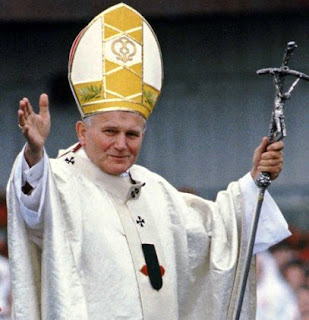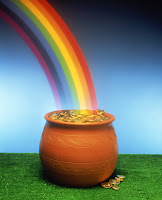Praying to Dead Popes
 So I was having lunch with a friend of mine the other day who is a non-Catholic. Stories abounded on television about the beatification of John Paul II, one of the most popular popes in my lifetime, if not for hundreds of years. My friend asked me: “Why would people pray to a dead pope?”
So I was having lunch with a friend of mine the other day who is a non-Catholic. Stories abounded on television about the beatification of John Paul II, one of the most popular popes in my lifetime, if not for hundreds of years. My friend asked me: “Why would people pray to a dead pope?”I was taken aback. I am a lapsed Catholic who considers himself to be an Episcopalian while currently attending a Lutheran church…don’t ask. I just assumed everybody knew why people would pray to a dead pope…or any of the saints for that matter. “What is it that you expect him to do?” he queried further.
Being raised Catholic, I never questioned the saints. I explained to my friend that we don’t pray to the saints for a direct act. We pray to the saints to intercede on our behalf with God. “Can’t you do that directly yourself?” he further inquired. He got me there. The Lutheran in me began to come out.
A few days later, I talked to another Catholic friend about the conversation. My friend said that I need to explain to my skeptical lunch mate that it is kind of like wanting to ask Barack Obama for a favor. You could write him directly, but he's a busy man. So you go to his closest advisor, say Rahm Emanuel, and ask him to put a good word for you. Rahm gladly obliges, but mentions that Joe Blow from Chicago would make a great Congressman, and could use some financial assistance. “I got it!” I said. Kind of like buying indulgences to get out of purgatory. There goes the Lutheran in me again.
Saints play a part in all Christian religions at least to a point. In mainstream Protestant religions, they are looked upon as people who lived lives worthy of imitation, people to be admired. We are all saints in the eyes of Protestantism. The Catholics are a little bit more pro-active. Catholics have special place in heaven for these holy people as evidenced by miracles attributed to them on earth after their death. These miracles show that the proposed saint is still with us, and will work on our behalf and assist us with our problems. It shows they have God’s ear.
The Catholic Church now has procedures for determining who should be declared a saint, or “canonized.” The first step is an inquiry into the life of the proposed saint, and an investigation as to whether this is a life worth emulating. The candidate is then deemed “venerable”, or worthy of special attention.
The next two steps are tricky. There has to be two miracles demonstrating the candidate has the ear of God in helping those who pray for intercession. After the first proven miracle, the candidate is beatified, and given the title “Blessed”. If a second miracle occurs, then the candidate is canonized, and becomes a full fledged saint. (Only one miracle is required if the candidate is martyred).
The church takes these miracles seriously. Each miracle is investigated thoroughly by both lay people and clergy. There can be no other explanation as to whatever the miracle happened to be. Sometimes this process takes a hundred years; but as of late the process is being sped up because of the popularity of John Paul II, and Mother Theresa, also being considered for sainthood. The Catholic faithful are demanding they be made saints.
This goes back to the roots of sainthood! In the early church, saints weren’t determined by a process, saints were declared by acclamation of the members of the church. There are approximately 10,000 saints in the Catholic Church. In a biblical timeline, the person furthest back who is a current saint is St. Anne, the non-biblical mother of Mary. Next is St. Elizabeth who was Mary’s cousin and the first to know of Mary’s pregnancy. “My soul doth magnify the Lord!” she declared. Her “Magnificat” has served as inspiration for many of the world’s greatest composers.
With so many saints, the Catholic Church has had to clean out the closet, so to speak. Many folks believe Paul VI threw out a bunch of saints, including the popular St. Christopher, the patron saint of travelers, whose statue or medals graced the dashboards or rearview mirrors of many an automobile. That isn’t what happened. Each of the saints had a feast day, and with so many saints, the calendar became a bit much. So he removed from the calendar those saints whose existence seemed to be based on tradition rather than fact. None were de-canonized, including St. Christopher. On the other hand, have you seen him on any dashboards lately? My St. Christopher medals are neatly stored in my jewelry box. When you're out...you're out!!
Many saints have worked their way into our secular culture. St. Nicholas is the obvious one. But many Catholics and non-Catholics alike pray to St. Anthony to help them find misplaced keys or glasses. St. Jude, the patron saint of hopeless causes, is also a national favorite. And how many houses in Youngstown have been sold because the owners buried St. Joseph upside down in the backyard. It works…try it!!
When it comes to saints, I tend to take the Protestant view of things. These are good people who led holy lives that we should all study and emulate. But if I were in trouble, or if a family member of mine were seriously ill, would I pray to the dead pope? Damn right I would; and I am glad John Paul, and all the saints, are there to nudge the Lord when I need some help.


Comments